#In Each Retelling
Text
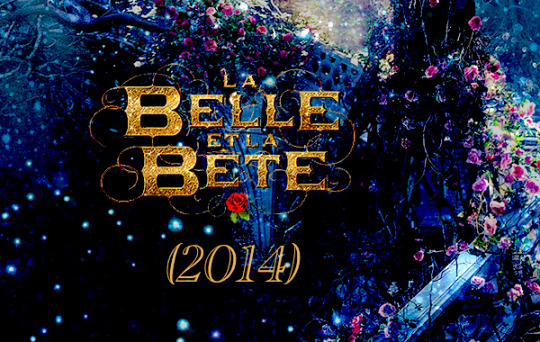
Sally forth, tally ho, let's kill this double feature at last! Jasmine, River, Sam, Ilana, Bryan, and Kyle come together again to discuss the 2014 version of La Belle et La Bete and we all ask incredibly important questions such as whether it was worth sparing Mickey Mouse's life for this movie, dear GOD who thought copying that one Mountain Dew Commercial with those puppy monkey babies was a good idea, why are we making so many Batman references, and most importantly, why bother doing a Beauty and the Beast retelling if you don't care about the romance?
#In Each Retelling#La Belle et la Bête (2014)#Based on: Beauty and the Beast#international media#period pieces#podcast#podcast episode
9 notes
·
View notes
Photo

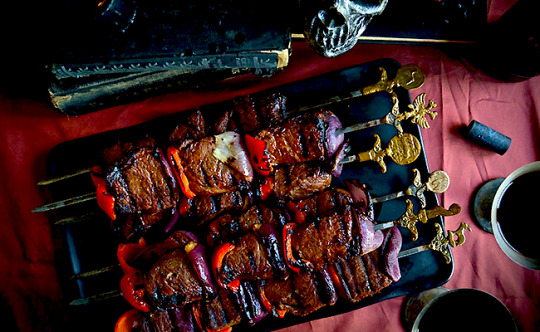
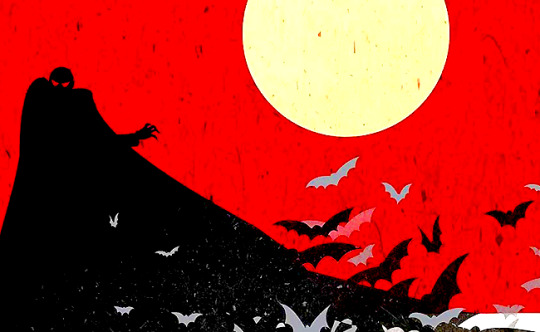
In honour of this year’s cycle of Dracula Daily, In Each Retelling decided to look at the robber’s steak mentioned in Chapter 5 — which Jonathan compares to London’s cat’s meat. And no, it’s not what you think.
Robber’s Steak (aka Vlad the Impaler Steaks)
— (adapted from Ghoul at Heart by Lori Castellon
FOR THE MARINADE
1/2 cup olive oil
1/3 cup soy sauce
1/4 cup lemon juice
2 tbsp Worcestershire sauce
4-5 cloves garlic, minced
2 tbsp Italian seasoning
2 tbsp dried minced onions
1 tbsp course ground pepper
2 tsp smoked paprika
2 tsp salt
FOR THE KEBOBS
6-8 sirloin steaks
4 red bell peppers, chopped
2 red onions, chopped
PREPARATIONS
Step 1
Mix together olive oil, soy sauce, lemon juice, Worcestershire sauce, garlic, onions, Italian seasoning, pepper, paprika and salt. Set aside.
Step 2
Cut each steak into large 3 inch pieces, transfer to a ziplock bag and pour marinade over steak, place in fridge to marinate overnight.
Step 3
Let meat sit at room temperature for 30 minutes as you prepare the vegetables. Thread the onion, steak, and bell pepper onto skewers.
Step 4
Grill kabobs over direct high heat for ~8 minutes for medium rare or until desired doneness. Let steak rest 5 minutes before serving.
4 notes
·
View notes
Text
When I say Doctor, you say Who! When I say Much, you say Ado! In honor of the 60th anniversary of Doctor Who reuniting fan favorites David Tennant and Catherine Tate, what better way to celebrate than discussing ANOTHER reunion of theirs, this time in a production of William Shakespeare's Much Ado About Nothing. Here we discuss their gangbusters chemistry, just how much Hero deserves better (even if Callie is a sucker for sad white boys), and just how chaotic and wonderful this production is...I'll be honest, listeners, this episode is EQUALLY chaotic, but I hope you find it just as wonderful.
Sorry this ran late a bit folks, clearly some prince's unscrupulous half brother is to blame...
#in each retelling#podcast#podcast episode#much ado about nothing#william shakespeare#doctor who#doctor who 60th anniversary#catherine tate#david tennant
7 notes
·
View notes
Text
If you've been boycotting Eurovision, you may have missed out on how bad it truly was, so here are a few events in no particular order:
The opening act of the semi-finals was Eric Saade, a swedish-palestinian singer who participated in Eurovision 2011. He wore a keffiyeh, a palestinian headdress, around his arm like a wristband.
Despite not making any political statements or drawing attention to his accessory, he was reprimanded by the EBU for "compromising the non-political nature of the event".
During their semi-final performance, the Irish contestant had the word "ceasefire" in old irish runes painted on their face. They were ordered to change it for the final, as it was deemed too political.
The contestant from Israel was not allowed to mingle with the other contestants, due to supposed security risks.
During an Interview, she was asked if she felt any concerns over her participation potentially endangering the event and the people present. The host told her she did not have to answer this question. Dutch contestant 'Joost' asked "why not?"
Joost, while not openly antagonizing the Israeli contestant, has made covert critical remarks about the EBUs decision to allow Israel to participate.
On Friday, the day before the Finale, Joost was investigated by the swedish police for a supposed incident where he threatened an EBU crew member. Thursday, a female camera operator had followed him off-stage to continue filming, even though there was an agreement not to film him off-stage. After she ignored his requests to stop, he threatened her with some sort of gesture.
Joost was disqualified mere hours before the finale. He was slotted to perform just before Israel and considered a favorite and potential winner.
The show itself did not address his disqualification. The dutch entry was simply skipped with no further comment.
Israeli broadcaster KAN was confirmed to have broken EBU rules during their coverage of the Irish act in the Semifinal. The commentator spoke negatively about their act, condemning the very scary goth aesthetic, and noting their willingness to criticize Israel's actions.
Despite Irish contestant Bambie Thug lodging a complaint with the EBU, there was no penalty or other repercussion.
If you were hoping that the event itself would turn into some sort of protest, I have to disappoint you:
Despite rumors of other contestants dropping out over Joost's disqualification, all of them performed.
There was audible booing every time Israel was on-screen, including their performance, announcement of points, and every time they received points. There was equally audible cheering.
No contestant or spokesperson directly addressed the ""controversy"" (read: ongoing genocide being artwashed), although very few made covert remarks about peace, love, dignity, and equality.
The most explicit it got was the Austrian spokesperson, saying something along the lines of "It's hard to find only positive words in a time where heartlessness prevails. But we hope everyone can unite through music and show that everyone deserves to be treated equally"
No one stormed on stage or held up a palestinian flag or anything, if you were hoping for that. I certainly was.
Israel gave its 12 points (both Jury and public) to Luxembourg. The singer is half-israeli and born in Jerusalem.
Jury votes mostly ignored Israel, netting them a total of 52 points through jury votes, which put them somewhere in the middle of the scoreboard. Norway, Cyprus, and Germany awarded them 8 points each, making them the main contributors.
In contrast, Israel received 323 points from the public voting. They were second only to Croatia with 337. 15 public votings, including "rest of the world" awarded Israel their 12 points, more than any other country would receive. The only countries not to award any points to Israel in the public vote were Croatia and Ukraine.
Israel thereby placed 5th out of 25.
But hey, at least the winner (Switzerland) was nonbinary, diversity win amirite.
Notably, they had to smuggle in their pride flag, since EBU guidelines only allow flags of participating countries and the rainbow flag. (This is also why palestinian flags were not allowed. It's not a new rule, but they certainly weren't going to start bending it now.)
If there's one thing to take away from this: Do not ever think the rest of the world is on your side, just because your social media is. The rest of the world has shown their allegiance, and it lies with Israel and Genocide.
Do not stop fighting for what is right.
#esc 2024#eurovision#boycott eurovision#joost klein#boycott israel#palestine#long post#political#bambie thug#ceasefire#what a world we live in that asking for a ceasefire is considered hateful and political#“stop killing each other” should not be a controversial take#also im not interested in any discourse about it#this is a retelling and some numbers on it#go bother someone else if you must
374 notes
·
View notes
Text
regulily & wolfstar where it's rich as fuck sirius and reg meeting up after years to try to reconnect, and meeting up in a cafe as its neutral ground but remus and lily work there and are just watching as a man dressed in leather and spikes and ripped denim, holding a motorbike helmet, shouts at a man who looks so similar to him but is wearing a black victorian suit and a briefcase with a jack the ripper badge.
#they come back each week and takes turns being the one to shout and dramatically leave first#its great entertainment for lily and remus#until one week where it was regulus' turn to leave first and sirius saunters up to the counter and retells his life story to them#regulus finds out and doesnt want them to be on sirius' side so next week he does the same to them#and now they're somehow caught in some random family drama of the most eccentric and annoying customers they've ever encountered#regulily#wolfstar#sirius black#regulus black#lily evans#remus lupin#marauders era#marauders
173 notes
·
View notes
Text
Greek Gods being desgined as colorful rainbow people my beloved
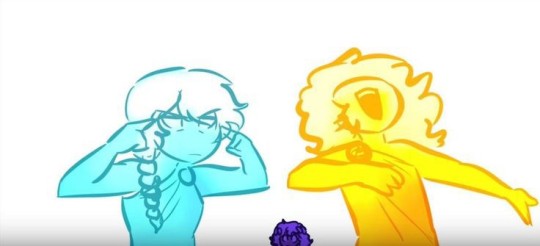
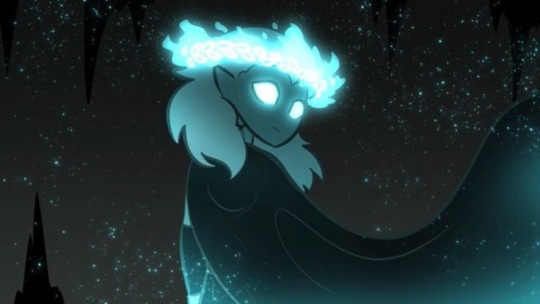
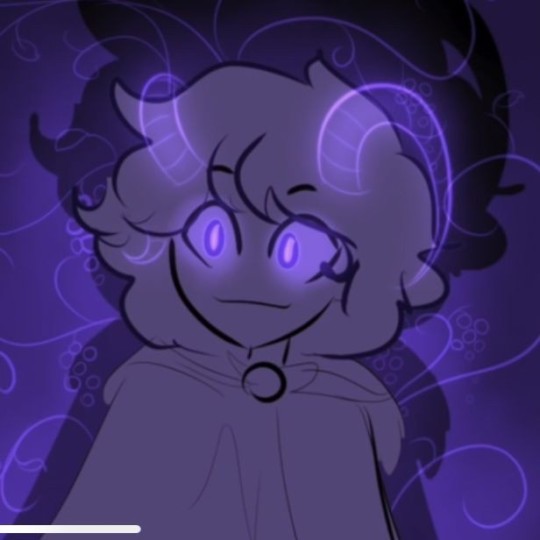
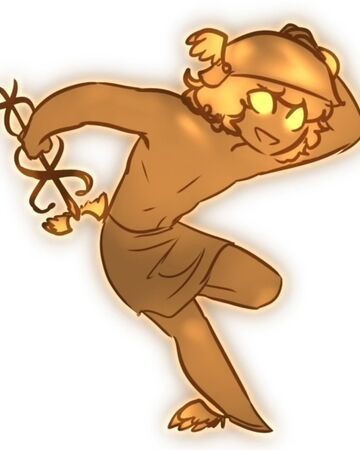
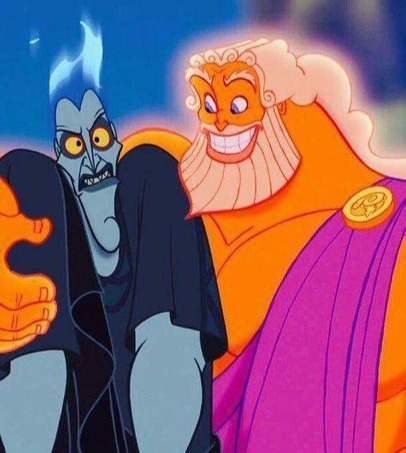


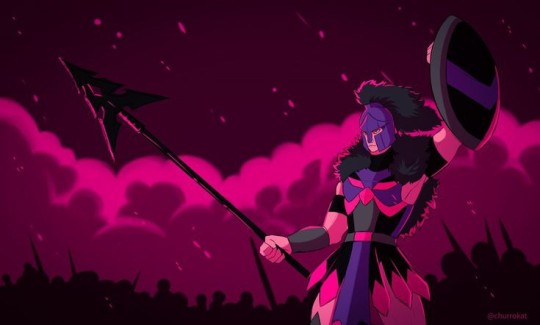
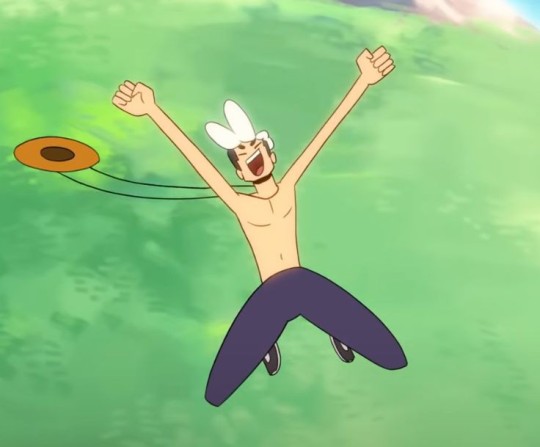
#schibi rambles#greek gods#greek mythology#osp#overly sarcastic productions#disney hercules#destripando la historia#dlh#i know lore olympus also does this i just havent read it thats why i didnt include it#also last 3 pic might be the most niche and underrated thing i have ever referenced#but i highly recommend it they are story/myth retellings done in song form each done with a different sound/genre#its all in youtube search destripando la historia and youre welcome
469 notes
·
View notes
Text
OKAY OKAY but the way Louis is split in two with both Claudia and Lestat trying to vie for his attention, for his love, but Claudia is able to jump into his mind, to ask him to come with her without Lestat hearing, and that’s the moment Lestat calls him Lou, because he sees him looking towards her and he has no idea what she’s telling him but he knows he’s losing him to her. And how that desperation immediately turns to rage, to blame, to accusation. By turning them both, he’s turned them both against him, he can’t read them, can’t understand them as deeply as they understand each other, and it’s only when Claudia says out loud so he can hear exactly what she wants him to: Come with me. Let’s be vampires worthy of your love. That he truly snaps.
Lestat knows he’s lost. Has known it for all the time Louis had spent searching restlessly for Claudia’s mind.
And the conclusion to this rage, with Lestat and Louis flown out far into the sky, so far away that Lestat hopes no other mind can reach Louis’. So that Claudia can’t hear. So that they’re truly alone. And he finally admits just how deeply his love for Louis reaches, and just how fine a thread he’s been clinging to coming to terms with the fact that perhaps Louis doesn’t love him, may never have loved him, in the way that he loves him.
And yet even in that moment with Louis half drained and gasping the frigid thin air, with Lestat begging him to just admit it, that he doesn’t love him, Louis... doesn’t. Instead he says let go of me. And I wonder, perhaps, what Lestat hears in that, what those words connote for him. Is Louis only asking to be put down, or is he asking Lestat to let go of this obsession with him? That change in Lestat’s eyes, the bitterness of not getting a solid answer but still coming to some sort of conclusion sells it for him. So, when he drops Louis, it’s as performative as any other gesture.
He may want Louis to feel that he is done with him, but that will never be true.
#iwtv#interview with the vampire#iwtv spoilers#1x05#loustat#a vile hunger for your hammering heart#lestat de lioncourt#louis de pointe du lac#claudia#i cannot encapsulate just how spectacular their dynamic is to me#and then of course you have louis' retellings in the present day absolutely hammering home that this performance of disconnect is a two way#street. that neither one will ever be done with the other.#he loves lestat too but the fact that they can't read each other's minds can't know each others thoughts puts that wedge between them#CONSTANTLY. they spend an endless dance of second guessing each other's feelings. and lestat's jealousy over claudia's ability to know#louis in a way he can't makes me insane. it's SO good.#anyway i have a lot of feelings so i'mma stop now 😂
1K notes
·
View notes
Text
Belladonna Took and Bungo Baggins, in The Hobbit comic adaptation Chapter 1:

vs Chapter 15!:

#the hobbit#lotr#tolkien 'i named him bungo because it sounds funny and boring and also bilbos mother gets no dialogue'#me: AHH they understood each other the way no one else did!! They saw the value in the things everyone overlooked!#romance for the ages!!!!#bringing out my pepe silvia conspiracy board to explain how they will parallel bilbo and thorin#its fun to see the panels side by side ;_;#I've been planning to draw the chapter 15 panel since basically day one#the hobbit comic#lord of the rings#retelling the hobbit#bungodonna#(lets make the ship name catch on)
171 notes
·
View notes
Text




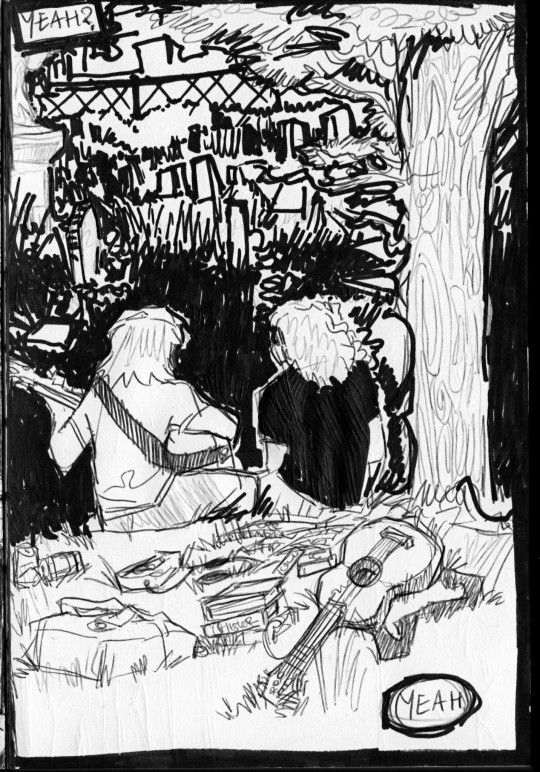
that type of person who you think you'd be friends with in every universe - expressed through jim & corey - id/transcript in alt text
so this is a kind of not-so-surprise for my friend @sinclarsupremacy , bc they were the first person i showed this two and was on the phone with me the whole time while i made it. didn't give a single thing away until everything was scanned and done. five dead pens and one reliable sharpie later, i show him this. wanted to get used to drawing the slipsour guyz more but also wanted to articulate something i have troubles saying to important people. this is kind of an ode to all my close friends ive made who i definitely wouldve hung around some graveyards with, and an ode to some bands i didnt know id like as much as i do 🫶
#corey taylor#jim root#also based on that one jim page where they called him the 'group ghoul' and talked about how hed get nightmares#of a flaming head telling him he was gonna burn in hell#ill tell you one thing. having dorks like nate in my life wouldve saved ME some melodrama#however i am always melodramatic (eg: this very post) so maybe it just wouldve made things melodramatic-er#slipknot#stone sour#<- again purely organizational i dont wanna step on anyones toes#artings#nate tag#dunno if i should tag this as#rpf#but considering this is a story ive growth'd from my dome. fictional retellings of irl doofuses & whatnot. whateva#prolly gonna go on a sideblog soon. you know how it goes#also im sorry jimberly i made you have the silhouette of a yugioh character#if this is rpf in the traditional sense call it the au where jim and corey are able to shoot the breeze like this#in a way that isnt insanely passive aggressive or terribly jokey or downright explosive. yknow how they be#drinking game: take a shot each time jim says yknow or coreys fucking HAT deteriorates in quality#tell your friends that you would be friends in every universe
40 notes
·
View notes
Text
Tell Your Dad You Love Him
A retelling of "Meat Loves Salt"/"Cap O'Rushes" for the @inklings-challenge Four Loves event
An old king had three daughters. When his health began to fail, he summoned them, and they came.
Gordonia and Rowan were already waiting in the hallway when Coriander arrived. They were leaned up against the wall opposite the king’s office with an air of affected casualness. “I wonder what the old war horse wants today?” Rowan was saying. “More about next year’s political appointments, I shouldn’t wonder.”
“The older he gets, the more he micromanages,” Gordonia groused fondly. “A thousand dollars says this meeting could’ve been an email.”
They filed in single-file like they’d so often done as children: Gordonia first, then Rowan, and Coriander last of all. The king had placed three chairs in front of his desk all in a row. His daughters murmured their greetings, and one by one they sat down.
“I have divided everything I have in three,” the king said. “I am old now, and it’s time. Today, I will pass my kingdom on to you, my daughters.”
A short gasp came from Gordonia. None of them could have imagined that their father would give up running his kingdom while he still lived.
The king went on. “I know you will deal wisely with that which I leave in your care. But before we begin, I have one request.”
“Yes father?” said Rowan.
“Tell me how much you love me.”
An awkward silence fell. Although there was no shortage of love between the king and his daughters, theirs was not a family which spoke of such things. They were rich and blue-blooded: a soldier and the daughters of a soldier, a king and his three court-reared princesses. The royal family had always shown their affection through double meanings and hot cups of coffee.
Gordonia recovered herself first. She leaned forward over the desk and clasped her father’s hands in her own. “Father,” she said, “I love you more than I can say.” A pause. “I don’t think there’s ever been a family so happy in love as we have been. You’re a good dad.”
The old king smiled and patted her hand. “Thank you, Gordonia. We have been very happy, haven’t we? Here is your inheritance. Cherish it, as I cherish you.”
Rowan spoke next; the words came tumbling out. “Father! There’s not a thing in my life which you didn’t give me, and all the joy in the world beside. Come now, Gordonia, there’s no need to understate the matter. I love you more than—why, more than life itself!”
The king laughed, and rose to embrace his second daughter. “How you delight me, Rowan. All of this will be yours.”
Only Coriander remained. As her sisters had spoken, she’d wrung her hands in her lap, unsure of what to say. Did her father really mean for flattery to be the price of her inheritance? That just wasn’t like him. For all that he was a politician, he’d been a soldier first. He liked it when people told the truth.
When the king’s eyes came to rest on her, Coriander raised her own to meet them. “Do you really want to hear what you already know?”
“I do.”
She searched for a metaphor that could carry the weight of her love without unnecessary adornment. At last she found one, and nodded, satisfied. “Dad, you’re like—like salt in my food.”
“Like salt?”
“Well—yes.”
The king’s broad shoulders seemed to droop. For a moment, Coriander almost took back her words. Her father was the strongest man in the world, even now, at eighty. She’d watched him argue with foreign rulers and wage wars all her life. Nothing could hurt him. Could he really be upset?
But no. Coriander held her father’s gaze. She had spoken true. What harm could be in that?
“I don’t know why you’re even here, Cor,” her father said.
Now, Coriander shifted slightly in her seat, unnerved. “What? Father—”
“It would be best if—you should go,” said the old king.
“Father, you can’t really mean–”
“Leave us, Coriander.”
So she left the king’s court that very hour.
.
It had been a long time since she’d gone anywhere without a chauffeur to drive her, but Coriander’s thoughts were flying apart too fast for her to be afraid. She didn’t know where she would go, but she would make do, and maybe someday her father would puzzle out her metaphor and call her home to him. Coriander had to hope for that, at least. The loss of her inheritance didn’t feel real yet, but her father—how could he not know that she loved him? She’d said it every day.
She’d played in the hall outside that same office as a child. She’d told him her secrets and her fears and sent him pictures on random Tuesdays when they were in different cities just because. She had watched him triumph in conference rooms and on the battlefield and she’d wanted so badly to be like him.
If her father doubted her love, then maybe he’d never noticed any of it. Maybe the love had been an unnoticed phantasm, a shadow, a song sung to a deaf man. Maybe all that love had been nothing at all.
A storm was on the horizon, and it reached her just as she made it onto the highway. Lightning flashed and thunder rolled. Rain poured down and flooded the road. Before long, Coriander was hydroplaning. Frantically, she tried to remember what you were supposed to do when that happened. Pump the brakes? She tried. No use. Wasn’t there something different you did if the car had antilock brakes? Or was that for snow? What else, what else–
With a sickening crunch, her car hit the guardrail. No matter. Coriander’s thoughts were all frenzied and distant. She climbed out of the car and just started walking.
Coriander wandered beneath an angry sky on the great white plains of her father’s kingdom. The rain beat down hard, and within seconds she was soaked to the skin. The storm buffeted her long hair around her head. It tangled together into long, matted cords that hung limp down her back. Mud soiled her fine dress and splattered onto her face and hands. There was water in her lungs and it hurt to breathe. Oh, let me die here, Coriander thought. There’s nothing left for me, nothing at all. She kept walking.
.
When she opened her eyes, Coriander found herself in a dank gray loft. She was lying on a strange feather mattress.
She remained there a while, looking up at the rafters and wondering where she could be. She thought and felt, as it seemed, through a heavy and impenetrable mist; she was aware only of hunger and weakness and a dreadful chill (though she was all wrapped in blankets). She knew that a long time must have passed since she was fully aware, though she had a confused memory of wandering beside the highway in a thunderstorm, slowly going mad because—because— oh, there’d been something terrible in her dreams. Her father, shoulders drooping at his desk, and her sisters happily come into their inheritance, and she cast into exile—
She shuddered and sat up dizzily. “Oh, mercy,” she murmured. She hadn’t been dreaming.
She stumbled out of the loft down a narrow flight of stairs and came into a strange little room with a single window and a few shabby chairs. Still clinging to the rail, she heard a ruckus from nearby and then footsteps. A plump woman came running to her from the kitchen, wiping her hands on her apron and softly clucking at the state of her guest’s matted, tangled hair.
“Dear, dear,” said the woman. “Here’s my hand, if you’re still unsteady. That’s good, good. Don’t be afraid, child. I’m Katherine, and my husband is Folke. He found you collapsed by the goose-pond night before last. I’m she who dressed you—your fine gown was ruined, I’m afraid. Would you like some breakfast? There’s coffee on the counter, and we’ll have porridge in a minute if you’re patient.”
“Thank you,” Coriander rasped.
“Will you tell me your name, my dear?”
“I have no name. There’s nothing to tell.”
Katherine clicked her tongue. “That’s alright, no need to worry. Folke and I’ve been calling you Rush on account of your poor hair. I don’t know if you’ve seen yourself, but it looks a lot like river rushes. No, don’t get up. Here’s your breakfast, dear.”
There was indeed porridge, as Katherine had promised, served with cream and berries from the garden. Coriander ate hungrily and tasted very little. Then, when she was finished, the goodwife ushered her over to a sofa by the window and put a pillow beneath her head. Coriander thanked her, and promptly fell asleep.
.
She woke again around noon, with the pounding in her head much subsided. She woke feeling herself again, to visions of her father inches away and the sound of his voice cracking across her name.
Katherine was outside in the garden; Coriander could see her through the clouded window above her. She rose and, upon finding herself still in a borrowed nightgown, wrapped herself in a blanket to venture outside.
“Feeling better?” Katherine was kneeling in a patch of lavender, but she half rose when she heard the cottage door open.
“Much. Thank you, ma’am.
“No thanks necessary. Folke and I are ministers, of a kind. We keep this cottage for lost and wandering souls. You’re free to remain here with us for as long as you need.”
“Oh,” was all Coriander could think to say.
“You’ve been through a tempest, haven’t you? Are you well enough to tell me where you came from?”
Coriander shifted uncomfortably. “I’m from nowhere,” she said. “I have nothing.”
“You don’t owe me your story, child. I should like to hear it, but it will keep till you’re ready. Now, why don’t you put on some proper clothes and come help me with this weeding.”
.
Coriander remained at the cottage with Katherine and her husband Folke for a week, then a fortnight. She slept in the loft and rose with the sun to help Folke herd the geese to the pond. After, Coriander would return and see what needed doing around the cottage. She liked helping Katherine in the garden.
The grass turned gold and the geese’s thick winter down began to come in. Coriander’s river-rush hair proved itself unsalvageable. She spent hours trying to untangle it, first with a hairbrush, then with a fine-tooth comb and a bottle of conditioner, and eventually even with honey and olive oil (a home remedy that Folke said his mother used to use). So, at last, Coriander surrendered to the inevitable and gave Katherine permission to cut it off. One night, by the yellow light of the bare bulb that hung over the kitchen table, Katherine draped a towel over Coriander’s shoulders and tufts of gold went falling to the floor all round her.
“I’m here because I failed at love,” she managed to tell the couple at last, when her sorrows began to feel more distant. “I loved my father, and he knew it not.”
Folke and Katherine still called her Rush. She didn’t correct them. Coriander was the name her parents gave her. It was the name her father had called her when she was six and racing down the stairs to meet him when he came home from Europe, and at ten when she showed him the new song she’d learned to play on the harp. She’d been Cor when she brought her first boyfriend home and Cori the first time she shadowed him at court. Coriander, Coriander, when she came home from college the first time and he’d hugged her with bruising strength. Her strong, powerful father.
As she seasoned a pot of soup for supper, she wondered if he understood yet what she’d meant when she called him salt in her food.
.
Coriander had been living with Katherine and Folke for two years, and it was a morning just like any other. She was in the kitchen brewing a pot of coffee when Folke tossed the newspaper on the table and started rummaging in the fridge for his orange juice. “Looks like the old king’s sick again,” he commented casually. Coriander froze.
She raced to the table and seized hold of the paper. There, above the fold, big black letters said, KING ADMITTED TO HOSPITAL FOR EMERGENCY TREATMENT. There was a picture of her father, looking older than she’d ever seen him. Her knees went wobbly and then suddenly the room was sideways.
Strong arms caught her and hauled her upright. “What’s wrong, Rush?”
“What if he dies,” she choked out. “What if he dies and I never got to tell him?”
She looked up into Folke’s puzzled face, and then the whole sorry story came tumbling out.
When she was through, Katherine (who had come downstairs sometime between salt and the storm) took hold of her hand and kissed it. “Bless you, dear,” she said. “I never would have guessed. Maybe it’s best that you’ve both had some time to think things over.”
Katherine shook her head. “But don’t you think…?”
“Yes?”
“Well, don’t you think he should have known that I loved him? I shouldn’t have needed to say it. He’s my father. He’s the king.”
Katherine replied briskly, as though the answer should have been obvious. “He’s only human, child, for all that he might wear a crown; he’s not omniscient. Why didn’t you tell your father what he wanted to hear?”
“I didn’t want to flatter him,” said Coriander. “That was all. I wanted to be right in what I said.”
The goodwife clucked softly. “Oh dear. Don’t you know that sometimes, it’s more important to be kind than to be right?”
.
In her leave-taking, Coriander tried to tell Katherine and Folke how grateful she was to them, but they wouldn’t let her. They bought her a bus ticket and sent her on her way towards King’s City with plenty of provisions. Two days later, Coriander stood on the back steps of one of the palace outbuildings with her little carpetbag clutched in her hands.
Stuffing down the fear of being recognized, Coriander squared her shoulders and hoped they looked as strong as her father’s. She rapped on the door, and presently a maid came and opened it. The maid glanced Coriander up and down, but after a moment it was clear that her disguise held. With all her long hair shorn off, she must have looked like any other girl come in off the street.
“I’m here about a job,” said Coriander. “My name’s Rush.”
.
The king's chambers were half-lit when Coriander brought him his supper, dressed in her servants’ apparel. He grunted when she knocked and gestured with a cane towards his bedside table. His hair was snow-white and he was sitting in bed with his work spread across a lap-desk. His motions were very slow.
Coriander wanted to cry, seeing her father like that. Yet somehow, she managed to school her face. Like he would, she kept telling herself. Stoically, she put down the supper tray, then stepped back out into the hallway.
It was several minutes more before the king was ready to eat. Coriander heard papers being shuffled, probably filed in those same manilla folders her father had always used. In the hall, Coriander felt the seconds lengthen. She steeled herself for the moment she knew was coming, when the king would call out in irritation, “Girl! What's the matter with my food? Why hasn’t it got any taste?”
When that moment came, all would be made right. Coriander would go into the room and taste his food. “Why,” she would say, with a look of complete innocence, “It seems the kitchen forgot to salt it!” She imagined how her father’s face would change when he finally understood. My daughter always loved me, he would say.
Soon, soon. It would happen soon. Any second now.
The moment never came. Instead, the floor creaked, followed by the rough sound of a cane striking the floor. The door opened, and then the king was there, his mighty shoulders shaking. “Coriander,” he whispered.
“Dad. You know me?”
“Of course.”
“Then you understand now?”
The king’s wrinkled brow knit. “Understand about the salt? Of course, I do. It wasn't such a clever riddle. There was surely no need to ruin my supper with a demonstration.”
Coriander gaped at him. She'd expected questions, explanations, maybe apologies for sending her away. She'd never imagined this.
She wanted very badly to seize her father and demand answers, but then she looked, really looked, at the way he was leaning on his cane. The king was barely upright; his white head was bent low. Her questions would hold until she'd helped her father back into his room.
“If you knew what I meant–by saying you were like salt in my food– then why did you tell me to go?” she asked once they were situated back in the royal quarters.
Idly, the king picked at his unseasoned food. “I shouldn’t have done that. Forgive me, Coriander. My anger and hurt got the better of me, and it has brought me much grief. I never expected you to stay away for so long.”
Coriander nodded slowly. Her father's words had always carried such fierce authority. She'd never thought to question if he really meant what he’d said to her.
“As for the salt,” continued the king, "Is it so wrong that an old man should want to hear his daughters say ‘I love you' before he dies?”
Coriander rolled the words around in her head, trying to make sense of them. Then, with a sudden mewling sound from her throat, she managed to say, “That's really all you wanted?”
“That's all. I am old, Cor, and we've spoken too little of love in our house.” He took another bite of his unsalted supper. His hand shook. “That was my failing, I suppose. Perhaps if I’d said it, you girls would have thought to say it back.”
“But father!” gasped Coriander, “That’s not right. We've always known we loved one another! We've shown it a thousand ways. Why, I've spent the last year cataloging them in my head, and I've still not even scratched the surface!”
The king sighed. “Perhaps you will understand when your time comes. I knew, and yet I didn't. What can you really call a thing you’ve never named? How do you know it exists? Perhaps all the love I thought I knew was only a figment.”
“But that’s what I’ve been afraid of all this time,” Coriander bit back. “How could you doubt? If it was real at all– how could you doubt?”
The king’s weathered face grew still. His eyes fell shut and he squeezed them. “Death is close to me, child. A small measure of reassurance is not so very much to ask.”
.
Coriander slept in her old rooms that night. None of it had changed. When she woke the next morning, for a moment she remembered nothing of the last two years.
She breakfasted in the garden with her father, who came down the steps in a chair-lift. “Coriander,” he murmured. “I half-thought I dreamed you last night.”
“I’m here, Dad,” she replied. “I’m not going anywhere.”
Slowly, the king reached out with one withered hand and caressed Coriander's cheek. Then, his fingers drifted up to what remained of her hair. He ruffled it, then gently tugged on a tuft the way he'd used to playfully tug her long braid when she was a girl.
“I love you,” he said.
“That was always an I love you, wasn’t it?” replied Coriander. “My hair.”
The king nodded. “Yes, I think it was.”
So Coriander reached out and gently tugged the white hairs of his beard. “You too,” she whispered.
.
“Why salt?” The king was sitting by the fire in his rooms wrapped in two blankets. Coriander was with him, enduring the sweltering heat of the room without complaint.
She frowned. “You like honesty. We have that in common. I was trying to be honest–accurate–to avoid false flattery.”
The king tugged at the outer blanket, saying nothing. His lips thinned and his eyes dropped to his lap. Coriander wished they wouldn’t. She wished they would hold to hers, steely and ready for combat as they always used to be.
“Would it really have been false?” the king said at last. “Was there no other honest way to say it? Only salt?”
Coriander wanted to deny it, to give speech to the depth and breadth of her love, but once again words failed her. “It was my fault,” she said. “I didn’t know how to heave my heart into my throat.” She still didn’t, for all she wanted to.
.
When the doctor left, the king was almost too tired to talk. His words came slowly, slurred at the edges and disconnected, like drops of water from a leaky faucet.
Still, Coriander could tell that he had something to say. She waited patiently as his lips and tongue struggled to form the words. “Love you… so… much… You… and… your sisters… Don’t… worry… if you… can’t…say…how…much. I… know.”
It was all effort. The king sat back when he was finished. Something was still spasming in his throat, and Coriander wanted to cry.
“I’m glad you know,” she said. “I’m glad. But I still want to tell you.”
Love was effort. If her father wanted words, she would give him words. True words. Kind words. She would try…
“I love you like salt in my food. You're desperately important to me, and you've always been there, and I don't know what I'll do without you. I don’t want to lose you. And I love you like the soil in a garden. Like rain in the spring. Like a hero. You have the strongest shoulders of anyone I know, and all I ever wanted was to be like you…”
A warm smile spread across the old king’s face. His eyes drifted shut.
#inklingschallenge#theme: storge#story: complete#inklings challenge#leah stories#OKAY. SO#i spend so much time thinking about king lear. i think i've said before that it's my favorite shakespeare play. it is not close#and one of the hills i will die on is that cordelia was not in the right when she refused to flatter her dad#like. obviously he's definitely not in the right either. the love test was a screwed up way to make sure his kids loved him#he shouldn't have tied their inheritances into it. he DEFINITELY shouldn't have kicked cordelia out when she refused to play#but like. Cordelia. there is no good reason not to tell your elderly dad how much you love him#and okay obviously lear is my starting point but the same applies to the meat loves salt princess#your dad wants you to tell him you love him. there is no good reason to turn it into a riddle. you had other options#and honestly it kinda bothers me when people read cordelia/the princess as though she's perfectly virtuous#she's very human and definitely beats out the cruel sisters but she's definitely not aspirational. she's not to be emulated#at the end of the day both the fairytale and the play are about failures in storge#at happens when it's there and you can't tell. when it's not and you think it is. when you think you know someone's heart and you just don'#hey! that's a thing that happens all the time between parents and children. especially loving past each other and speaking different langua#so the challenge i set myself with this story was: can i retell the fairytale in such a way that the princess is unambiguously in the wrong#and in service of that the king has to get softened so his errors don't overshadow hers#anyway. thank you for coming to my TED talk#i've been thinking about this story since the challenge was announced but i wrote the whole thing last night after the super bowl#got it in under the wire! yay!#also! the whole 'modern setting that conflicts with the fairytale language' is supposed to be in the style of modern shakespeare adaptation#no idea if it worked but i had a lot of fun with it#pontifications and creations
68 notes
·
View notes
Text
It’s important that the first revelation of Nissa Nissa is accompanied by some level of skepticism from Salladhor Saan and aversion on Davos’ part. It doesn’t sound right that Azor Ahai chose to sacrifice his wife for a magic sword. It shouldn’t sound right.
“A hundred days and a hundred nights he labored on the third blade, and as it glowed white-hot in the sacred fires, he summoned his wife. ‘Nissa Nissa,’ he said to her, for that was her name, ‘bare your breast, and know that I love you best of all that is in this world.’ She did this thing, why I cannot say, and Azor Ahai thrust the smoking sword through her living heart. It is said that her cry of anguish and ecstasy left a crack across the face of the moon, but her blood and her soul and her strength and her courage all went into the steel. Such is the tale of the forging of Lightbringer, the Red Sword of Heroes.
“Now do you see my meaning? Be glad that it is just a burnt sword that His Grace pulled from that fire. Too much light can hurt the eyes, my friend, and fire burns.” Salladhor Saan finished the last grape and smacked his lips. “When do you think the king will bid us sail, good ser?”
[…] A true sword of fire, now, that would be a wonder to behold. Yet at such a cost … When he thought of Nissa Nissa, it was his own Marya he pictured, a good-natured plump woman with sagging breasts and a kindly smile, the best woman in the world. He tried to picture himself driving a sword through her, and shuddered. I am not made of the stuff of heroes, he decided. If that was the price of a magic sword, it was more than he cared to pay.
Not only does it not make sense that Nissa Nissa would agree to her husband’s request, it’s also telling how Salladhor Saan expresses relief in knowing that King Stannis didn’t actually forge Lightbringer. Because forging Lightbringer means human sacrifice. And why should one be deprived of their life, even if it’s for a magic sword? Davos is very right to be creeped out by it.
The theme of sacrifice shows up quite a bit in ASOIAF and Davos I isn’t the first or last time. The very first chapter in the series, Bran I, tackles this idea with Jon and the direwolves.
“Lord Stark,” Jon said. It was strange to hear him call Father that, so formal. Bran looked at him with desperate hope. “There are five pups,” he told Father. “Three male, two female.”
“What of it, Jon?”
“You have five trueborn children,” Jon said. “Three sons, two daughters. The direwolf is the sigil of your House. Your children were meant to have these pups, my lord.”
Bran saw his father’s face change, saw the other men exchange glances. He loved Jon with all his heart at that moment. Even at seven, Bran understood what his brother had done. The count had come right only because Jon had omitted himself. He had included the girls, included even Rickon, the baby, but not the bastard who bore the surname Snow, the name that custom decreed be given to all those in the north unlucky enough to be born with no name of their own.
Their father understood as well. “You want no pup for yourself, Jon?” he asked softly.
“The direwolf graces the banners of House Stark,” Jon pointed out. “I am no Stark, Father.”
Jon, though he may desperately desire to have his own piece of magic, would not sacrifice his siblings for it. He wouldn’t dare to deprave the girls, Arya and Sansa, of their own magic even when it might be very easy to do so. This is a pretty stark contrast (pun intended) to Azor Ahai and his Nissa Nissa. Azor Ahai’s first line of thought was to sacrifice his wife whereas Jon’s was to sacrifice himself. Sure Azor Ahai got his magic sword, but Jon’s self-sacrifice is not in vain either because he later earns his own wolf, who turns out to be even more special than the rest in the pack.
Bran IV kind of alludes to the idea of self sacrifice through Old Nan’s retelling of the last hero:
So as cold and death filled the earth, the last hero determined to seek out the children, in the hopes that their ancient magics could win back what the armies of men had lost. He set out into the dead lands with a sword, a horse, a dog, and a dozen companions. For years he searched, until he despaired of ever finding the children of the forest in their secret cities. One by one his friends died, and his horse, and finally even his dog, and his sword froze so hard the blade snapped when he tried to use it. And the Others smelled the hot blood in him, and came silent on his trail, stalking him with packs of pale white spiders big as hounds—”
Though the one we know is called the “last hero”, notice that it’s not a title but a mere descriptor; there were many heroes before him who died and he was the last one standing. There is a human toll in this legend, but it’s implied to be self sacrifice. It’s also interesting that though there is mention of a blade, it is the children of the forest’s magic that is key. This does kind of bleed into what we know about the Night’s Watch and its relation to the long night. The Night’s Watch victory was a group effort, rather than the actions of any one man.
We have several legends surrounding the long night that work, but only one involves the cost of sacrificing someone else (that we know of). This might be where GRRM is headed with Stannis and his creation of Lightbringer. Sure Azor Ahai did get his magic sword, but it doesn’t negate the steep human cost. GRRM has lowkey confirmed that Stannis is sure to burn Shireen. And rather than this sacrifice not working, I think it’s more likely that it does work. Stannis does indeed create the flaming sword. But this will be directly weighed by other (self) sacrifices made for the same purpose. Stannis’ sacrifice of his daughter won’t work any better than other characters who choose to sacrifice themselves even when knowing that they are not going to go down as individual legends; I think Jon Snow will once again be the prime example of this, as he has already resigned himself to being a shadow in history despite initially wanting the opposite. Maester Aemon was right in saying that
[…] all deceive ourselves, when we want to believe. Melisandre most of all, I think. The sword is wrong, she has to know that … light without heat … an empty glamor … the sword is wrong, and the false light can only lead us deeper into darkness, Sam
The sword is wrong. Azor Ahai is NOT one to be emulated. Rather, he should be a cautionary tale. He is not any more special for his sacrifice than what the last hero or the men of the Night’s Watch did, even though we know his name but don’t know theirs. GRRM answered the question regarding sacrifice before he even posed it. To make someone else pay the price is flat out wrong. The only true and worthy sacrifice is really that of the self.
#asoiaf#valyrianscrolls#azor ahai#the last hero#stannis baratheon#jon snow#the night's watch#didn’t put in the post but if Jon’s ADWD dream turns out to be true and he does gain his own flaming sword i tend to think he’ll get it#by giving up himself or part of himself in the process#jon is perhaps the most self sacrificial character in this series#which is why theories that dany will be his nissa nissa miss the mark almost entirely#if jon is to be a hero he will do it by sacrificing himself not someone else#he already demonstrated this in agot when he refused a direwolf and again in adwd when he refused winterfell#stannis is meant to be his foil so we could see them being weighed against each other#not to mention that jon’s adwd dream is very much a last hero retelling with references to his companions falling#and him outlasting them though there’s a really interesting reference to him killing robb and ygritte#but I think it’s more to do with killing his own desires to remain at the wall - in addition to his feelings of guilt and abandonment
44 notes
·
View notes
Text

Once upon a time, a little over a year ago, from the mind of one Conor Duffy and the Fate TTRPG system came a tale about Jean Valjean, Queen Titania, Morgan le Fay, Alice, and Christine Daae being called on to stop a thief from stealing the very power of storytelling, while having to escape Chateau Dif, defeat the Sweet Witch, and persuade the First Goddess along the way. Now in anticipation of its upcoming sequel charity stream, we gather the cast and producers to discuss what inspired the portrayals of these various characters, the nature of storytelling itself, and what makes certain stories stick with us.
#In Each Retelling#Musica Universalis#Based on: Les Misérables#Based on: A Midsummer Night's Dream#Based on: Arthurian Legend#Based on: Alice's Adventures in Wonderland#Based on: The Phantom of the Opera#all the world's a stage#podcast#podcast episode
3 notes
·
View notes
Photo

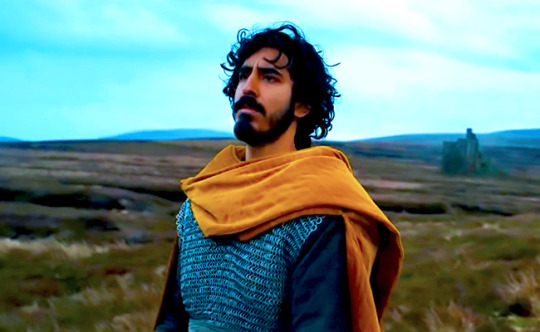
Welcome to our first bonus blog, the new post segment where we’ll be covering all the miscellaneous things about insert-media-here that didn’t make it into the episode! This week we’re sharing observations and fun facts about the 2021 release of The Green Knight starring Dev Patel as told by IER’s very own Shamila Karunakaran, who unfortunately had to bow out of recording due to losing her voice.
This post touches on themes of racism and sexual harassment. And as always, beware of spoilers:
People in this movie really love to cradle Gawain’s face (it's understandable though, Dev Patel and his magnificent beard are extremely pretty here) and the lord and the lady are clearly trying to recruit him as their third.
Bi!Gawain is hardly a concept exclusive to the movie either. In the original story, he kisses both the lady and the lord eagerly without being prompted. He even kisses the lord three times! It’s not like in the film where Gawain is being harassed by the lady and the lord on separate occasions and is clearly frightened by their intimidation. It’s hardly necessary when there’s so much enthusiastic consent in the source material itself.
Dev Patel continues to be adorable with animals as seen with Armani the horse. He’d never ridden a horse before so not only did Dev feed his animal co-star dandelions in between takes, he also tried to gain Armani’s favour by sneaking him apples he had pilfered from the hotel lobby. Petition for Dev to play a Disney prince in 2024!
Gawain’s encounter with Erin Kellyman’s character is itself a retelling within a retelling! It’s only mentioned briefly in one line of Sir Gawain and the Green Knight, but St. Winifred was an seventh-century Welsh martyr who had wanted to become a nun. According to legend, a travelling prince became enamoured with her beauty and tried to force himself on her after she rejected him and when she fled to her uncle’s church, the prince decapitated her after the ensuing chase. A healing spring appeared where her head fell and she was brought back to life when her uncle returned her head to her body, but she would have a red mark around her neck where it had been sliced through for the rest of her life.
Some of the details have been changed in the film with the suitor now being a lord who returned to kill her after she rejected his advances, but unsurprisingly, Winifred herself is the patron saint against unwanted advances. When you take into consideration that Winifred is played by a white and Jamaican actress and how her bodily autonomy has been violated by a white man for rejecting what he wanted from her, it’s understandable that Winifred gets upset and outright questions why Gawain would ever ask what she would give him in return for her head.
She likely thought that she found an ally in a non-white Gawain, but even if he was going through the chivalry script, there’s still an expectation and entitlement to get something in return. Gawain still has a certain privilege over Winifred simply through being non-Black.
I do love that they took this not even a footnote of a character from the original story and fleshed out a scene for her and I do love that Erin Kellyman got to play a traditionally white character. That being said, she shouldn’t have been the only Black character in the film and don’t try to argue for historical accuracy, more Black British actresses in period pieces, period!
Fun fact: the places in Wales where St. Winifred was decapitated is traditionally considered to be a place Gawain passed through on his way to the Green Chapel. The original story references Gawain traveling past a place called "Holy Hede", which modern scholars generally agree is the Welsh town of Holywell, the site of St. Winifred’s Well.
Very irrelevant detail, but the way that Sarita Choudhury is dressed in The Green Knight reminds me of Sophie Okonedo's wardrobe as Margaret of Anjou in The Hollow Crown. It’s an interesting throughline considering Sarita and Sophie both play complicated older female characters who were originally white in their respective old British source materials and have lost their sons by the end of their respective stories, depending on the interpretation you go with for the former.
If I had a nickel... well, I’d have three since Gawain goes on to lose his own son in the vision of the bad future he has.
But let’s get further into Sarita’s casting or more specifically, who she plays in the movie. And to the trolls in the comments, Sarita is half white and her character is canonically Arthur's half-sister, both in the film and the source material, it's perfectly plausible for Sarita and Sean Harris to play siblings.
While Sarita’s character is simply called Mother in the credits, she’s a composite of both Morgause and Morgan le Fay, both half-sisters of Arthur in legend. Morgause is mother to Gawain and his more infamous half-brother Mordred (Sacha Dhawan for the role anyone?) while Morgan le Fay is the sorceress orchestrating the events of Sir Gawain and the Green Knight.
And Gawain himself is also a composite with Mordred, especially the part where he is Arthur’s delfacto heir and is despised by his subjects.
As David Lowery states, the relationship between Morgan le Fay and Gawain written for the film evokes Lowery's own experiences with his mother and needing to be pushed to stand on his own as an adult. Having mother and son both be brown in the film adds another layer to an already complicated relationship and reminds me WAY too much of what it was like growing up with a brown mother myself.
When you think more on it, Gawain and Morgan being brown gives further insight into their motivations. It’s telling that even with all his flaws, Gawain as a brown man would still see himself as unfit to be heir to his legendary white uncle. He himself even says that “I have [no tales of myself] to tell”, which works on a metatextual level since there are very few popular portrayals of Arthurian Knights who look anything like Dev Patel.
With Morgan’s case, you could argue that her being brown would be another sign of her being “othered” in Camelot. Even though her half-brother is king, it’s already canon that he hasn’t been very involved in Morgan and Gawain’s lives and if he didn’t give them support, who else would? Especially since it’s already established that even the tavern patrons have no respect for Morgan, freely insulting her to Gawain’s face.
With that context in mind, it makes sense that Morgan would be more proactive in being a shaper of destiny for both herself and her son, even if that means bringing down the fall of a society she had no place in.
And consider this: given who his mother is, the vision that Gawain has about the bad future near the end of the film: was it really the product of his imagination or did he inherit some form of magic from Morgan le Fay after all? You could argue that the Green Knight is responsible for causing the vision, but when you realize the extent of Morgan’s role in summoning him in the source material...
Finally, what sort of story would you come up with for the little girl playing with Arthur’s crown in the stinger? What would be her role in a potential sequel? Is she Gawain’s foil or would she be more like him than she’d like to admit? What sort of relationship does she have with Morgan le Fay? Is she the future heir of Camelot or does she spell trouble by inheriting her grandmother's magic? Or porque no los dos? If this is something you’d be interested in exploring, dear listeners, we bequeath this prompt to you.
#In Each Retelling#Bonus Blog#The Green Knight#Sir Gawain and the Green Knight#Dev Patel#Sarita Choudhury
5 notes
·
View notes
Text
In honor of the recent cinematic release of the Hunger Games prequel, A Ballad of Songbirds and Snakes, we at IER decided it'd be fun to contemplate how to turn some classic stories into this genre that made so many of us, yet fell so far from grace. Join Grady, Callie, Sam, and me in pitching YA Dystopia Retellings, from Grady once again making Snow White somehow even more violent than the original fairytale, to the horrors of realizing that Dorian Gray would be just as bad as the worst of current politicians but with actual charisma, to the epic worldbuilding of Sam's Twelve Dancing Princesses, and to my own idea for a post climate apocalypse Little Mermaid.
#in each retelling#podcast#the hunger games#a ballad of songbirds and snakes#ya dystopia#snow white#the picture of dorian gray#the twelve dancing princesses#the little mermaid#fairytales#oscar wilde
2 notes
·
View notes
Text

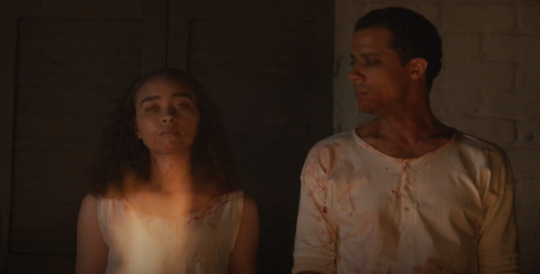
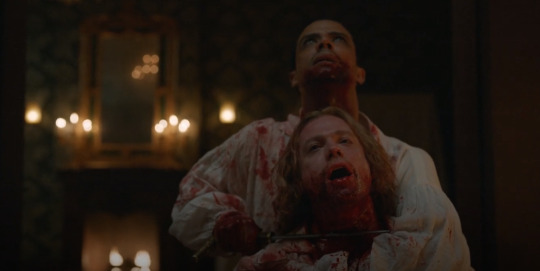

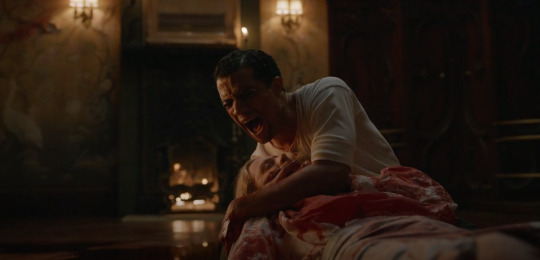

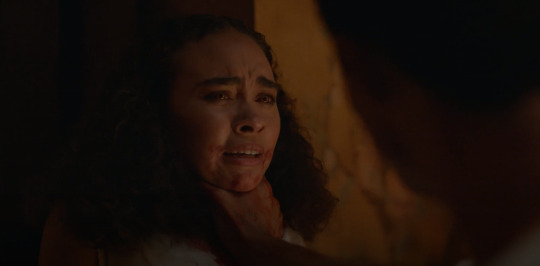






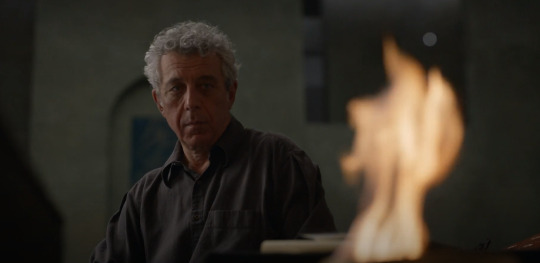


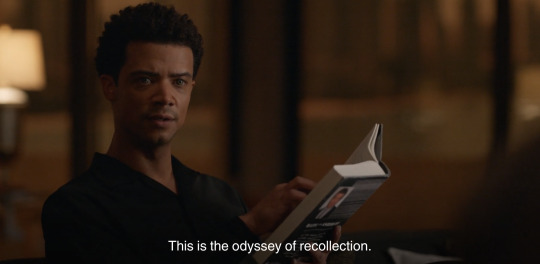


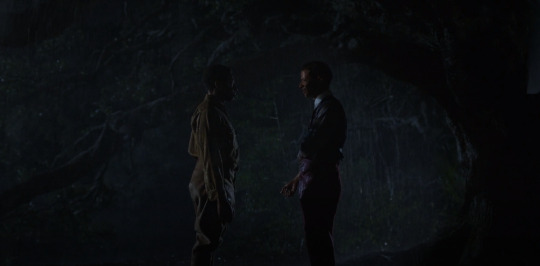
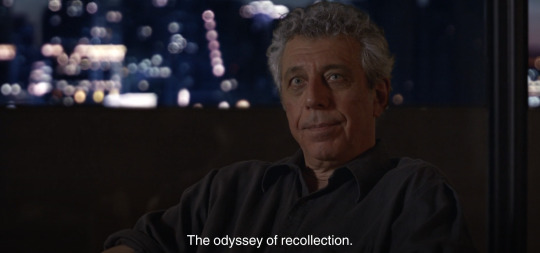
LIAR, LIAR
amc's interview with the vampire
"cover story" by richard siken
isaiah 59: 2-3
the stanley parable by davey wreden and william pugh
black sails
kieran culkin for vulture
a web weave for @iwtvfanevents saint louis of the vieux carré event: day 7 — memory
#iwtv#iwtvfanevents#ldpdl#louis de pointe du lac#web weave#all bitches know is was it raining louis all bitches know is web weave iwtv#interview with the vampire#iwtv 2022#my edit#also quoting the stanley parable was an insane move on my part but like. an interactive story about#stories themselves. and narration and the fourth wall and retelling and untelling and time loops and existence within a tale and#nonexistence outside one. okayyyyyy#wait also me as me realizing that rackhams a story is true monologue rhymes. black sails is never beating the play alligations#WAIT ALLSOOO daniel and louis weaponizing the ‘odyssey of recollection’ against each other in their little gay mindfuck is soo important#st. louis of the vieux carré
146 notes
·
View notes
Text
mirage being called sunshine and v2 having the icarus motif is driving me So fucking crazy
#kicking my leg so hard#anywayz u guys know how there’s one retelling of the icarus story where icarus flew too close to the sun to meet his lover [ apollo ]#and then crashed into the sea laughing#im such a loser for v2 adoring mirage and filling in the gaps of where her self deprecation ends and her joy begins#and then mirage being the one v2 can look forward to each day#anywayz I love them so bad . Shaking#ultrakill#v2mirage#ultrakill v2#mirage ultrakill
42 notes
·
View notes